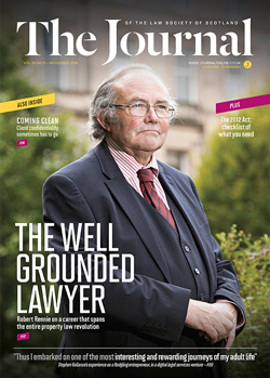The path less travelled
The Law Society of Scotland’s recent survey of people who have embarked on an alternative route to qualification has provided new insight into their motivations and experience of taking this less travelled path.
What are the alternative routes?
Records held by the Society reveal that since 1997, 96 people have embarked on one of two alternative routes to qualification. The first and most common alternative route, the “pre-PEAT traineeship”, is an alternative to the LLB. It involves completing a three-year training contract with a Scottish solicitor and nine professional examinations. Thereafter, individuals complete the standard PEAT 1 (Diploma) and PEAT 2 (traineeship) stages.
The second alternative route, the “non-PEAT 1 Diploma”, is an alternative to the Diploma, in which individuals complete an additional year of training with a Scottish solicitor and three professional examinations before completing the standard traineeship. The intake for the non-PEAT 1 Diploma is very low, as only individuals with exceptional circumstances are eligible.
New insight
In September 2014, the Society conducted a survey of alternative route alumni as part of an ongoing review of the alternative routes to qualification. The majority of respondents were women (68%) and succeeded in qualifying as a solicitor (86%). The location of alternative route alumni reflects general trends in the profession, such that the majority of survey respondents (57%) trained in the central belt or Aberdeen.
Interestingly, the survey reveals that those already working in the legal profession in some form are most likely to embark on an alternative route. Most respondents (83%) had prior work (e.g. paralegal or secretarial) experience in the legal sector, and two-thirds were 25 or over when they commenced an alternative route. The results also demonstrate that the alternative routes are challenging and far from an “easy option”. Indeed, the majority of respondents found balancing full-time work with self-taught study, in addition to other personal commitments, very challenging.
One respondent, for example, noted: “I would not have qualified had it not been for the support (financial, personal and professional) of my employers and family. The alternative route requires determination and commitment. It is not for the faint hearted!”
Despite these challenges, the determination and commitment of alternative route graduates often does pay off. The results demonstrate that alternative route graduates not only have the same potential to succeed at every level in the profession as their standard route peers, they also feel well equipped for a career as a solicitor, as these comments illustrate:
“From my point of view, completing the pre-PEAT traineeship route has left me far better qualified to do my job than I would have been had I followed the conventional route.”
“It is a respected route… [that] produces lawyers with genuine ambition to pursue a career in law and who have realistic expectations as to what that career will involve.”
The destinations of pre-PEAT traineeship graduates suggest the market agrees. It is well known that traineeships at the largest firms in the country are coveted and, therefore, access to them is highly competitive. A good number of the largest firms have recruited alternative route alumni: three have offered a pre-PEAT traineeship; five have employed pre-PEAT alumni as trainee solicitors; and four have hired pre-PEAT alumni as newly qualified solicitors.
Promoting diversity
All respondents thought the alternative routes boost diversity in the profession. In this regard, one respondent noted: “I think the alternative route helps to ensure diversity by allowing people (albeit within law firms) to become solicitors who would not otherwise be able to.”
This observation is supported by the overall survey results, which reveal that a majority of people were motivated to complete an alternative route because they were already working in a law firm that was willing to support them, and/or they needed to work whilst studying for financial or other reasons. Although the number of alternative route alumni is relatively small, it clearly performs an important function in promoting diversity.
Room for improvements?
The overall feedback from the survey suggests that the alternative route alumni not only support its continued existence, but think it should be more widely promoted. A number of suggestions were also made for how the current alternative routes could be improved, such as: accelerated options to recognise prior relevant work experience; improved study materials for the professional examinations; and improved access to a peer support network. The Education & Training Subcommittee is currently reviewing this feedback to consider whether these changes could be implemented.
In this issue
- Age before duty
- Title to tissue
- Standing the test of time?
- Adjudication: a risk of abuse?
- Courts in all but name
- When is a person a “relevant person”?
- Reading for pleasure
- Opinion: John Scott QC
- Book reviews
- Profile
- President's column
- People on the move
- The designated day is here
- A tale of two systems
- LBTT: the rules and rates emerge
- The price of probity
- Play to your strengths
- Into the unknown
- A changing landscape
- Get the basics right
- Holiday pay: give us a break
- Money into thin air?
- Pathways to justice
- Flesh on the bones
- Scottish Solicitors Discipline Tribunal
- Streams of thought
- Over the finishing line
- Over the finishing line (full version)
- Law reform roundup
- The path less travelled
- The right kind of risk
- Frauds and scams – increasing awareness
- Ask Ash
- The process engineer's tale
- To disclose or not to disclose?






